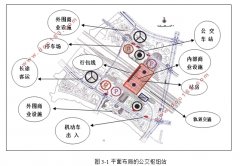公交场站商业开发模式研究

1.无需注册登录,支付后按照提示操作即可获取该资料.
2.资料以网页介绍的为准,下载后不会有水印.资料仅供学习参考之用.
密 惠 保
公交场站商业开发模式研究(论文19000字)
摘 要
随着城市经济的迅猛发展,城市规模的不断扩大,社会大众对城市公交的出行需求逐渐加大,但由于公交公益性事业发展的限制,政府对公交建设投入有限,占地较大的公交场站使用率低下,建设滞后等问题日益凸显,研究公交场站商业开发模式显得尤为必要。
本文在理清公交场站分类及特征的基础上,对公交场站开发建设的四种模式进行分析研究,分析了公交场站的3种布局模式。三种模式为平面式、地下式、立体式,立体模式里讲诉了6种模式,并结合日本”荣”交通枢纽以及昆明公交场站商业开发模式做具体的案例分析,主要分析了昆明的螺蛳湾商贸城以及南山区的公交停保场,并对公交场站商业开发建设做进一步的总结分析及启示。
关键词:公交场站;商业开发;模式
Abstract
With the city's rapid economic development, the city continues to expand, the public demand for travel on city buses gradually increased, but due to the development of public transportation restrictions, the government limited public transportation construction investment, covering a larger field bus Underutilized station, construction lag and other issues become increasingly prominent, research bus station business development model is particularly necessary.
In this paper, to clarify the bus station on the basis of the classification and characteristics of the bus station for the development and construction of four modes analysis, analysis of the .three kinds of bus station layout mode.Three models for planar and underground with spatial patterns Spatial patterns of about 6 models combined withJapan's "wing" transport hub and Kunming bus station business development model to make a specific case study, and then make a busstation business model adaptability summary recommendation.
Key Words:bus station;business development;model
[来源:http://think58.com]

目 录
摘 要 I
ABSTRACT II
目 录 III
第1章 绪论 1
1.1选题背景及意义 1
1.2国内外研究综述 1
1.2.1国外研究情况 1
1.2.2国内研究情况 1
1.3研究内容 3
1.4本文采用的研究手段 4
1.5研究技术路线 4
第2章 公交场站分类及特征研究 5
2.1公交场站的分类 5
2.1.1中途站 5
2.1.2公交首末站 6
2.1.3中心站 7
2.1.4枢纽站 8
2.2公交场站的主要特征 8
第3章 公交场站的开发建设 10
3.1公交场站开发建设模式分析 10
3.1.1政府投资—委托企业经营模式 10
3.1.2政府—企业共同投资经营模式 10
3.1.3企业独立投资经营模式 11
3.1.4“企业投资经营—政府扶持调控”模式 12
3.2公交场站的布局 12
3.2.1平面布局模式 12
3.2.2地下式布局 13
3.2.3立体布局模式 14
第4章 公交场站开发案例分析 17
4.1日本名古屋“荣”公共交通枢纽站 17
4.1.1”荣”的开发建设模式 17
4.1.2“荣”的布局模式分析 18
4.1.3“荣”的思考与启迪 20
4.2昆明公交场站研究 22
4.2.1昆明公交发展现状 22
4.2.2实地调研分析 23
第5章 总结与启示 28
参考文献 29 [资料来源:THINK58.com]
致谢 30
[资料来源:THINK58.com]
